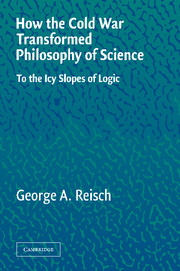Book contents
- Frontmatter
- Contents
- Preface and Acknowledgments
- 1 An Introduction to Logical Empiricism and the Unity of Science Movement in the Cold War
- 2 Otto Neurath, Charles Morris, Rudolf Carnap, and Philipp Frank: Political Philosophers of Science
- 3 Leftist Philosophy of Science in America and the Reception of Logical Empiricism in New York City
- 4 “Doomed in Advance to Defeat”? John Dewey on Reductionism, Values, and the International Encyclopedia of Unified Science
- 5 Red Philosophy of Science: Blumberg, Malisoff, Somerville, and Early Philosophy of Science
- 6 The View from the Left: Logical Empiricism and Radical Philosophers
- 7 The View from the Far Left: Logical Empiricism and Communist Philosophers
- 8 Postwar Disillusionment, Anti-Intellectualism, and the Values Debate
- 9 Horace Kallen's Attack on the Unity of Science
- 10 Creeping Totalitarianism, Creeping Scholasticism: Neurath, Frank, and the Trouble with Semantics
- 11 Frank's Neurathian Crusade: Science, Enlightenment, and Values
- 12 “A Very Fertile Field for Investigation”: Anticollectivism and Anticommunism in Popular and Academic Culture
- 13 Anticommunist Investigations, Loyalty Oaths, and the Wrath of Sidney Hook
- 14 Competing Programs for Postwar Philosophy of Science
- 15 Freedom Celebrated: The Professional Decline of Philipp Frank and the Unity of Science Movement
- 16 The Marginalization of Charles Morris
- 17 Values, Axioms, and the Icy Slopes of Logic
- 18 Professionalism, Power, and What Might Have Been
- References
- Index
5 - Red Philosophy of Science: Blumberg, Malisoff, Somerville, and Early Philosophy of Science
Published online by Cambridge University Press: 21 January 2010
- Frontmatter
- Contents
- Preface and Acknowledgments
- 1 An Introduction to Logical Empiricism and the Unity of Science Movement in the Cold War
- 2 Otto Neurath, Charles Morris, Rudolf Carnap, and Philipp Frank: Political Philosophers of Science
- 3 Leftist Philosophy of Science in America and the Reception of Logical Empiricism in New York City
- 4 “Doomed in Advance to Defeat”? John Dewey on Reductionism, Values, and the International Encyclopedia of Unified Science
- 5 Red Philosophy of Science: Blumberg, Malisoff, Somerville, and Early Philosophy of Science
- 6 The View from the Left: Logical Empiricism and Radical Philosophers
- 7 The View from the Far Left: Logical Empiricism and Communist Philosophers
- 8 Postwar Disillusionment, Anti-Intellectualism, and the Values Debate
- 9 Horace Kallen's Attack on the Unity of Science
- 10 Creeping Totalitarianism, Creeping Scholasticism: Neurath, Frank, and the Trouble with Semantics
- 11 Frank's Neurathian Crusade: Science, Enlightenment, and Values
- 12 “A Very Fertile Field for Investigation”: Anticollectivism and Anticommunism in Popular and Academic Culture
- 13 Anticommunist Investigations, Loyalty Oaths, and the Wrath of Sidney Hook
- 14 Competing Programs for Postwar Philosophy of Science
- 15 Freedom Celebrated: The Professional Decline of Philipp Frank and the Unity of Science Movement
- 16 The Marginalization of Charles Morris
- 17 Values, Axioms, and the Icy Slopes of Logic
- 18 Professionalism, Power, and What Might Have Been
- References
- Index
Summary
While the New York philosophers enlisted logical empiricism and the Unity of Science movement in their battles where they could, they were also welcomed by other left-leaning philosophers of science of the 1930s. Some lived or circulated outside New York City and remind us, therefore, that leftist philosophy of science was not a historical phenomenon isolated within New York. They were also farther to the left than the liberal pragmatists. In terms of the survey of the philosophical left sketched in chapter 3, those discussed here belonged to the Socialist left and admired logical empiricism and the Unity of Science movement as allies in their various campaigns for international socialism.
Albert Blumberg (1906–1997)
Albert Blumberg played a very early role in the reception of logical empiricism. Born in 1906 to Russian parents in Baltimore, Blumberg grew up to study at City Colleges in New York, Johns Hopkins, Yale, and the Sorbonne. He then received his doctorate under Schlick at the University of Vienna. From 1931 to 1937 he taught philosophy at Johns Hopkins and helped to introduce logical empiricism to readers of the Journal of Philosophy. With Herbert Feigl, who arrived at Harvard from Vienna in 1930, he co-wrote “Logical Positivism: A New Movement in European Philosophy” (1931). They described the new movement as a synthesis of empiricist and rationalist traditions that was made possible by Russell and Whitehead's new logic and that promised unprecedented analytic power for making sense of the recent and startling developments in physics.
- Type
- Chapter
- Information
- How the Cold War Transformed Philosophy of ScienceTo the Icy Slopes of Logic, pp. 96 - 117Publisher: Cambridge University PressPrint publication year: 2005



